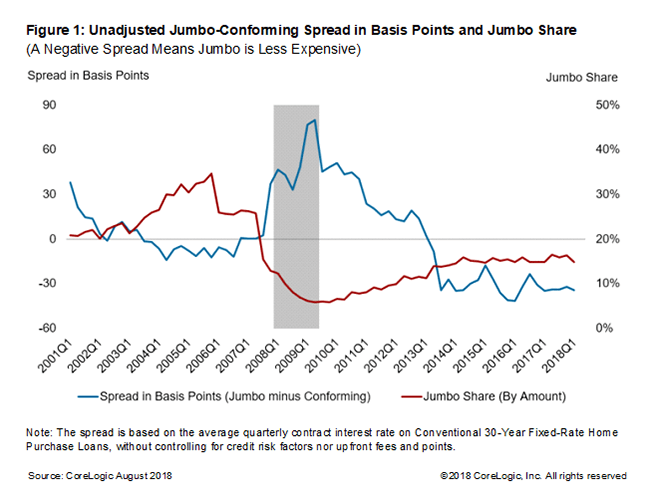Jumbo Loan: Tailored Home Mortgage Solutions for High-Income Borrowers
Jumbo Loan: Tailored Home Mortgage Solutions for High-Income Borrowers
Blog Article
Browsing the Jumbo Lending Landscape: Vital Insights for First-Time Homebuyers
Navigating the complexities of big lendings offers a distinct collection of difficulties for novice homebuyers, especially in a developing actual estate market. Understanding the essential qualification requirements and possible benefits, together with the drawbacks, is vital for making informed choices. In addition, developing a strong financial method can significantly improve your prospects.
Comprehending Jumbo Loans

Since jumbo lendings are not backed by government-sponsored entities, they lug various underwriting criteria and require more comprehensive financial documentation. This difference can cause higher rates of interest compared to conventional lendings, offered the increased risk to lending institutions. Nonetheless, big fundings likewise offer one-of-a-kind benefits, such as the capability to fund higher-value residential or commercial properties and possibly a lot more versatile terms.
Newbie homebuyers ought to likewise realize that protecting a jumbo funding typically necessitates a bigger deposit, normally ranging from 10% to 20%. In addition, customers are usually expected to show solid creditworthiness and a secure income to certify. Understanding these subtleties can encourage novice buyers to make informed decisions when checking out big funding alternatives in their quest of homeownership.
Eligibility Demands
Safeguarding a jumbo funding calls for conference specific qualification requirements that differ substantially from those of standard fundings. Unlike standard lendings, which are typically backed by government-sponsored entities, big loans are not insured or guaranteed, causing more stringent criteria.
One main demand is a greater credit rating. Lenders commonly anticipate a minimal rating of 700, although some might allow lower ratings under particular problems (jumbo loan). Additionally, customers must demonstrate a durable monetary profile, that includes a low debt-to-income (DTI) ratio, typically no more than 43%. This makes sure that debtors can handle their regular monthly repayments together with other monetary responsibilities.
Moreover, many loan providers need substantial documents, consisting of evidence of income, possession statements, and tax obligation returns for the previous two years. A significant deposit is additionally crucial; while traditional fundings may permit down settlements as low as 3%, jumbo financings commonly require at the very least 20%, depending upon the lender and the loan amount.

Advantages of Jumbo Fundings
For many first-time property buyers, jumbo finances supply distinct advantages that can facilitate the journey toward homeownership. One of the primary benefits is the capability to finance residential properties that go beyond the adjusting loan limits established by government-sponsored entities. This adaptability makes it possible for customers to access a bigger series of high-value homes in affordable genuine estate markets.
Furthermore, jumbo lendings frequently come with attractive rates of interest that can be reduced than those of standard fundings, particularly for debtors with solid credit accounts. This can lead to considerable savings over the life of the loan, making homeownership extra economical. Jumbo lendings usually permit for greater loan quantities without the need for personal home mortgage insurance (PMI), which can better decrease monthly repayments and get redirected here total costs.
:max_bytes(150000):strip_icc()/dotdash-jumbo-vs-conventional-mortgages-how-they-differ-v2-75c8bd243a054517aa21385ef266c11d.jpg)
Prospective Disadvantages
Lots of prospective property buyers might discover that jumbo finances featured substantial downsides that necessitate mindful factor to consider. Among the main worries is the rigid credentials criteria. Unlike conforming lendings, jumbo loans typically call for greater credit history, usually going beyond 700, and considerable earnings documentation, making them less available for some debtors.
Furthermore, jumbo loans usually include higher rates of interest compared to conventional lendings, which can cause enhanced monthly settlements and general loaning expenses. This premium might be especially difficult for new property buyers who are currently browsing the monetary complexities of purchasing a home.
Another remarkable disadvantage is the bigger deposit requirement. Several loan providers anticipate a minimum deposit of 20% or more, which can pose an obstacle for buyers with minimal savings. In addition, the absence of federal government backing for big lendings causes less positive terms, increasing the threat for loan providers and, consequently, the borrowing expenses for property owners.
Lastly, market changes can dramatically impact the resale value of high-end buildings financed with jumbo finances, including an element of financial unpredictability that newbie buyers might find difficult.
Tips for First-Time Homebuyers
Browsing the intricacies of the homebuying procedure can be frustrating for new buyers, particularly when considering jumbo fundings (jumbo loan). To streamline this trip, sticking to some vital approaches can make a significant difference
First, educate on your own on jumbo finances and their details needs. Recognize the various borrowing standards, consisting of credit history, debt-to-income ratios, and deposit expectations. Typically, a minimum credit history of 700 and a down settlement of a minimum of 20% are necessary for approval.
Second, involve with an educated home mortgage expert. They can supply insights tailored to your economic scenario and assist you browse the ins and outs of the big loan landscape.
Third, consider pre-approval to reinforce your buying setting. A pre-approval letter signals to sellers that you are a serious purchaser, which can be beneficial in competitive markets.
Last but not least, do not overlook the significance of budgeting. Variable in all costs connected with homeownership, including real estate tax, upkeep, and homeowners' insurance. By following these ideas, newbie purchasers can come close additional hints to the jumbo finance procedure with higher confidence and clearness, improving their chances of successful homeownership.
Conclusion
In conclusion, navigating the big funding landscape requires a thorough understanding of eligibility standards, benefits, and possible drawbacks. Inevitably, extensive preparation and education regarding jumbo loans can lead to even more enlightened decision-making in the homebuying process.
When browsing the complexities of the real estate market, comprehending jumbo finances is essential for new homebuyers intending for residential or commercial properties that surpass conventional funding restrictions. Jumbo fundings are non-conforming loans that usually go beyond the conforming car loan restriction established by the Federal Housing Finance Company (FHFA)In addition, big lendings commonly come with eye-catching interest rates that can be lower than those of standard finances, especially for borrowers with solid credit scores accounts. Jumbo financings normally allow for greater car loan amounts without the requirement for private home mortgage insurance coverage (PMI), which index can even more decrease total costs and regular monthly repayments.
Unlike adapting lendings, big car loans typically call for higher credit history ratings, frequently surpassing 700, and substantial income documentation, making them much less obtainable for some customers.
Report this page